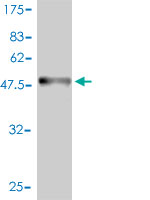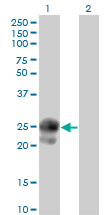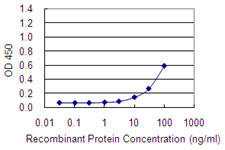BAMBI Antibody (monoclonal) (M01)
Mouse monoclonal antibody raised against a full length recombinant BAMBI.
- SPECIFICATION
- CITATIONS
- PROTOCOLS
- BACKGROUND

Application
| WB, E |
|---|---|
| Primary Accession | Q13145 |
| Other Accession | BC019252 |
| Reactivity | Human |
| Host | Mouse |
| Clonality | Monoclonal |
| Isotype | IgG1 kappa |
| Clone Names | 3C1-1D1 |
| Calculated MW | 29108 Da |
| Gene ID | 25805 |
|---|---|
| Other Names | BMP and activin membrane-bound inhibitor homolog, Non-metastatic gene A protein, Putative transmembrane protein NMA, BAMBI, NMA |
| Target/Specificity | BAMBI (AAH19252, 1 a.a. ~ 260 a.a) full-length recombinant protein with GST tag. MW of the GST tag alone is 26 KDa. |
| Dilution | WB~~1:500~1000 |
| Format | Clear, colorless solution in phosphate buffered saline, pH 7.2 . |
| Storage | Store at -20°C or lower. Aliquot to avoid repeated freezing and thawing. |
| Precautions | BAMBI Antibody (monoclonal) (M01) is for research use only and not for use in diagnostic or therapeutic procedures. |

Thousands of laboratories across the world have published research that depended on the performance of antibodies from Abcepta to advance their research. Check out links to articles that cite our products in major peer-reviewed journals, organized by research category.
info@abcepta.com, and receive a free "I Love Antibodies" mug.
Provided below are standard protocols that you may find useful for product applications.
Background
This gene encodes a transmembrane glycoprotein related to the type I receptors of the transforming growth factor-beta (TGF-beta) family, whose members play important roles in signal transduction in many developmental and pathological processes. The encoded protein however is a pseudoreceptor, lacking an intracellular serine/threonine kinase domain required for signaling. Similar proteins in frog, mouse and zebrafish function as negative regulators of TGF-beta, which has led to the suggestion that the encoded protein may function to limit the signaling range of the TGF-beta family during early embryogenesis.
References
1.Adiponectin induces the transforming growth factor decoy receptor BAMBI in human hepatocytes.Wanninger J, Neumeier M, Bauer S, Weiss TS, Eisinger K, Walter R, Dorn C, Hellerbrand C, Schaffler A, Buechler C.FEBS Lett. 2011 Apr 7. [Epub ahead of print]2.BAMBI Is Expressed in Endothelial Cells and Is Regulated by Lysosomal/Autolysosomal Degradation.Xavier S, Gilbert V, Rastaldi MP, Krick S, Kollins D, Reddy A, Bottinger E, Cohen CD, Schlondorff D.PLoS One. 2010 Sep 24;5(9):e12995.3.BAMBI is overexpressed in ovarian cancer and co-translocates with Smads into the nucleus upon TGF-ss treatment.Pils D, Wittinger M, Petz M, Gugerell A, Gregor W, Alfanz A, Horvat R, Braicu EI, Sehouli J, Zeillinger R, Mikulits W, Krainer M.Gynecol Oncol. 2010 Feb 25. [Epub ahead of print]4.BAMBI (bone morphogenetic protein and activin membrane-bound inhibitor) reveals the involvement of the transforming growth factor-beta family in pain modulation.Tramullas M, Lantero A, Diaz A, Morchon N, Merino D, Villar A, Buscher D, Merino R, Hurle JM, Izpisua-Belmonte JC, Hurle MA.J Neurosci. 2010 Jan 27;30(4):1502-11.
If you have used an Abcepta product and would like to share how it has performed, please click on the "Submit Review" button and provide the requested information. Our staff will examine and post your review and contact you if needed.
If you have any additional inquiries please email technical services at tech@abcepta.com.













 Foundational characteristics of cancer include proliferation, angiogenesis, migration, evasion of apoptosis, and cellular immortality. Find key markers for these cellular processes and antibodies to detect them.
Foundational characteristics of cancer include proliferation, angiogenesis, migration, evasion of apoptosis, and cellular immortality. Find key markers for these cellular processes and antibodies to detect them. The SUMOplot™ Analysis Program predicts and scores sumoylation sites in your protein. SUMOylation is a post-translational modification involved in various cellular processes, such as nuclear-cytosolic transport, transcriptional regulation, apoptosis, protein stability, response to stress, and progression through the cell cycle.
The SUMOplot™ Analysis Program predicts and scores sumoylation sites in your protein. SUMOylation is a post-translational modification involved in various cellular processes, such as nuclear-cytosolic transport, transcriptional regulation, apoptosis, protein stability, response to stress, and progression through the cell cycle. The Autophagy Receptor Motif Plotter predicts and scores autophagy receptor binding sites in your protein. Identifying proteins connected to this pathway is critical to understanding the role of autophagy in physiological as well as pathological processes such as development, differentiation, neurodegenerative diseases, stress, infection, and cancer.
The Autophagy Receptor Motif Plotter predicts and scores autophagy receptor binding sites in your protein. Identifying proteins connected to this pathway is critical to understanding the role of autophagy in physiological as well as pathological processes such as development, differentiation, neurodegenerative diseases, stress, infection, and cancer.




